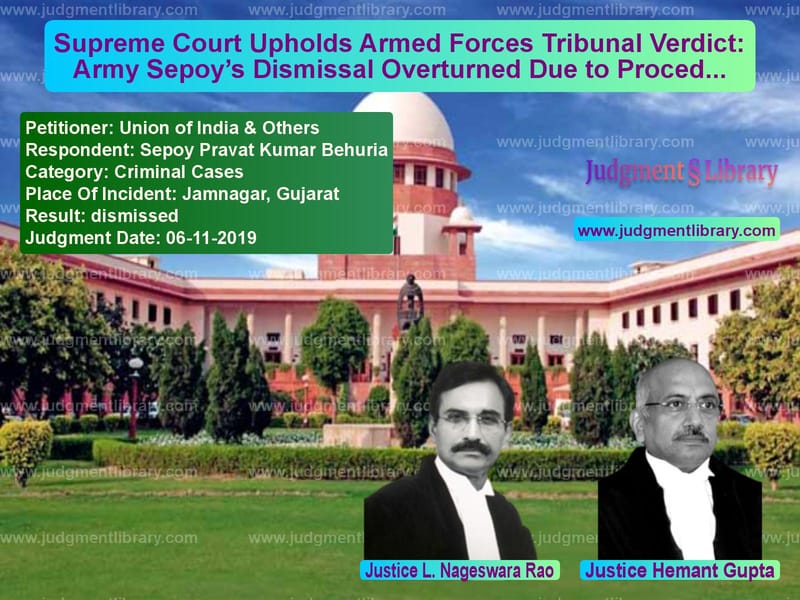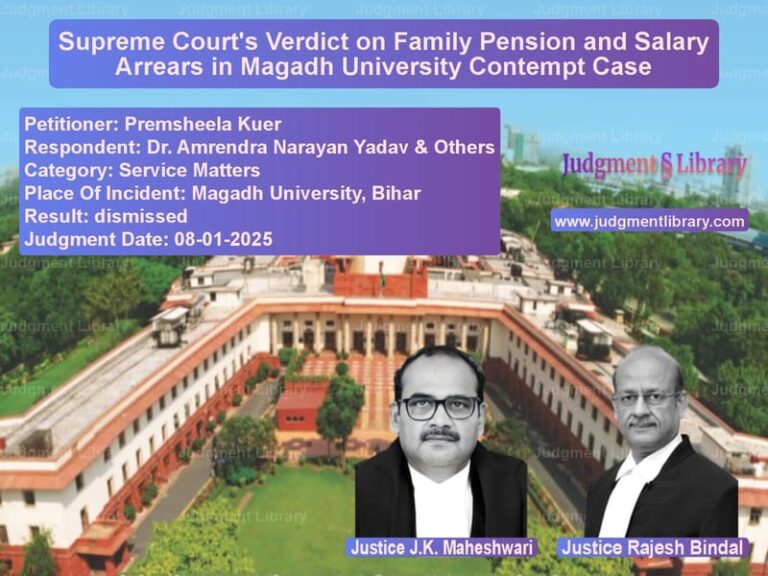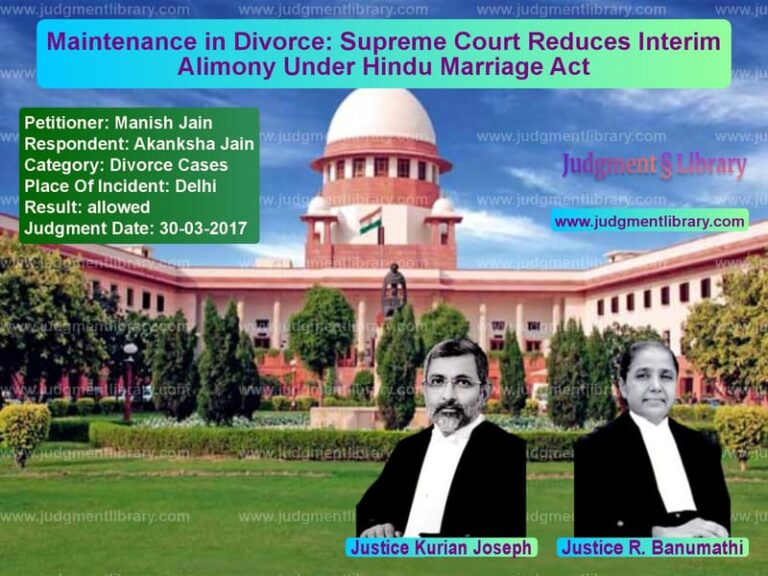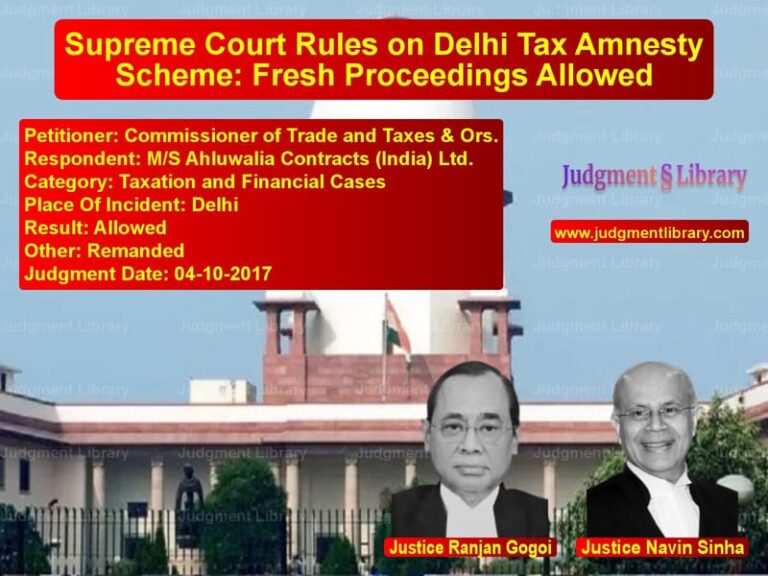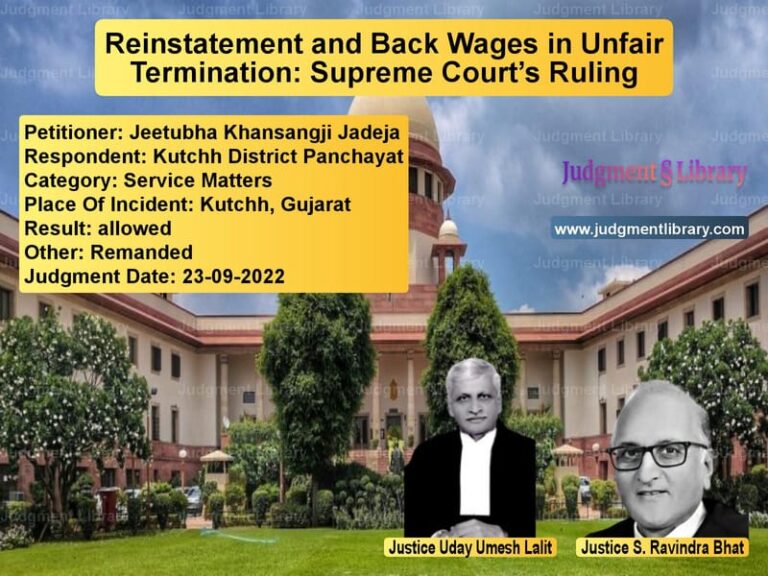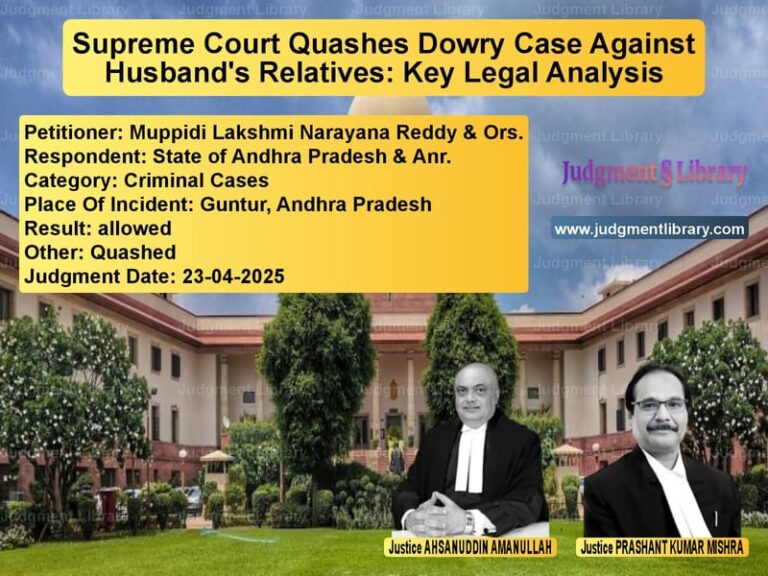Supreme Court Upholds Armed Forces Tribunal Verdict: Army Sepoy’s Dismissal Overturned Due to Procedural Lapses
On November 6, 2019, the Supreme Court of India delivered its judgment in the case of Union of India & Others vs. Sepoy Pravat Kumar Behuria. The case revolved around the dismissal of Sepoy Pravat Kumar Behuria from the Indian Army following an incident in which he allegedly attacked his superior officer with a sharp-edged weapon. The Armed Forces Tribunal (AFT) had earlier ruled in favor of Behuria, setting aside his dismissal on grounds of procedural violations and inconsistencies in the evidence. The Supreme Court, after examining the case in detail, upheld the Tribunal’s ruling.
Background of the Case
Sepoy Pravat Kumar Behuria was enlisted in the Indian Army on February 2, 2002, and was posted at Jamnagar in June 2011. On June 2, 2011, at approximately 7:45 AM, he allegedly assaulted Subedar/Master Technical (Communication) Satyendra Singh Yadav with a talwar (grass-cutting tool). According to the prosecution, Behuria struck Yadav twice, once on the head and again on the forehead, before being restrained by Naib Subedar A.P. Singh. Yadav sustained serious injuries, including a skull fracture, and underwent surgery due to internal bleeding and blood clotting in the brain.
Court of Inquiry and Summary Court Martial
Following the incident, a Court of Inquiry was convened under the command of Colonel Sanjay Khanna on June 3, 2011, to investigate the matter. The inquiry examined nine witnesses, but Behuria declined to cross-examine them or provide any statement in his defense. The inquiry concluded that action should be taken against him.
Subsequently, between June 10 and June 15, 2011, a summary of evidence was recorded by Lt. Col. Amarvir Singh. During this phase, 12 witnesses testified, and Behuria again refused to cross-examine them. Additionally, on October 20, 2011, an additional summary of evidence was recorded with two more witnesses being examined. The prosecution claimed that Behuria voluntarily confessed to attacking Yadav without provocation.
Based on this evidence, a Summary Court Martial (SCM) was conducted on July 23, 2012, where Behuria was found guilty and dismissed from service.
Appeal Before the Armed Forces Tribunal
Challenging his dismissal, Behuria filed an appeal before the Armed Forces Tribunal (AFT), Lucknow. He raised several procedural and evidentiary concerns:
- He was kept in close arrest from June 2 to October 5, 2011, without the necessary approval from the Chief of the Army Staff.
- He was not given a fair opportunity to participate in the Court of Inquiry or to cross-examine witnesses during the summary of evidence proceedings.
- The Summary Court Martial was conducted in a hasty manner, completing the entire process in just 45 minutes.
- The medical evidence contradicted the oral testimony of witnesses. While he was accused of using a sharp-edged talwar, the medical report indicated a compressed injury rather than an incised wound.
- No scientific evidence, such as fingerprints or blood on the weapon, was presented to conclusively link him to the attack.
After reviewing the case, the AFT ruled in Behuria’s favor, concluding that the Summary Court Martial was conducted with a predetermined mindset and that key procedural requirements under the Army Act and Army Rules were violated.
Supreme Court’s Findings
The Union of India challenged the AFT’s ruling before the Supreme Court, arguing that the tribunal had erred in setting aside Behuria’s dismissal. However, after scrutinizing the case records, the Supreme Court upheld the AFT’s judgment.
Key Observations of the Supreme Court:
- Pre-signed Documents: The Court found significant procedural irregularities in the way Behuria’s signatures were recorded during the summary of evidence proceedings. It observed that his signatures appeared to have been taken in advance on blank pages, with the depositions being filled in later. This indicated that due process was not followed.
- Hasty Court Martial: The Summary Court Martial proceedings lasted for only 45 minutes. The Supreme Court deemed this to be evidence of a lack of due consideration and procedural fairness.
- Violation of Army Rules 179 and 180: The Court agreed with the AFT’s finding that Behuria was not given a proper opportunity to defend himself as required under the Army Rules.
- Contradictions in Medical and Witness Evidence: The Court took note of the AFT’s findings regarding inconsistencies between the medical evidence and oral testimonies. The absence of blood on the weapon and the lack of fingerprint analysis further weakened the prosecution’s case.
Referring to its earlier judgment in Ghurey Lal v. State of Uttar Pradesh, the Supreme Court reiterated that acquittals should not be overturned unless there are compelling reasons. It cited several principles, including:
- The trial court’s conclusion was not palpably wrong.
- The decision was not based on an erroneous view of the law.
- The judgment did not lead to a miscarriage of justice.
- The trial court did not ignore material evidence.
Final Judgment
Concluding its review, the Supreme Court ruled that the evidence against Behuria was insufficient to justify his dismissal. The Court stated:
“A view that the respondent is guilty is possible on a scrutiny of the oral evidence. However, the relevant factors taken into account by the Tribunal present another probable view. It is settled law that if two views can be reached, the one that leads to acquittal has to be preferred to the other, which would end in conviction.”
Accordingly, the Supreme Court dismissed the appeal by the Union of India and upheld the AFT’s decision, allowing Behuria’s reinstatement.
Conclusion
The Supreme Court’s ruling in this case underscores the importance of procedural fairness in military disciplinary actions. The decision reinforces that due process must be meticulously followed, especially in cases where an individual’s career and reputation are at stake. The judgment serves as a reminder that while maintaining discipline within the armed forces is crucial, it must not come at the cost of fundamental rights and legal safeguards.
Petitioner Name: Union of India & Others.Respondent Name: Sepoy Pravat Kumar Behuria.Judgment By: Justice L. Nageswara Rao, Justice Hemant Gupta.Place Of Incident: Jamnagar, Gujarat.Judgment Date: 06-11-2019.
Don’t miss out on the full details! Download the complete judgment in PDF format below and gain valuable insights instantly!
Download Judgment: Union of India & Oth vs Sepoy Pravat Kumar B Supreme Court of India Judgment Dated 06-11-2019.pdf
Direct Downlaod Judgment: Direct downlaod this Judgment
See all petitions in Bail and Anticipatory Bail
See all petitions in Custodial Deaths and Police Misconduct
See all petitions in Attempt to Murder Cases
See all petitions in Judgment by L. Nageswara Rao
See all petitions in Judgment by Hemant Gupta
See all petitions in dismissed
See all petitions in supreme court of India judgments November 2019
See all petitions in 2019 judgments
See all posts in Criminal Cases Category
See all allowed petitions in Criminal Cases Category
See all Dismissed petitions in Criminal Cases Category
See all partially allowed petitions in Criminal Cases Category

